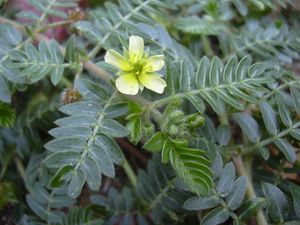Note: This is a project under development. The articles on this wiki are just being initiated and broadly incomplete. You can Help creating new pages.
Difference between revisions of "Tribulus terrestris - Gokshura"
(Created page with "thumb|right|''Gokshura'', ''Tribulus terrestris'', ''Small Caltrops'' Tribulus terrestris is an annual plant in the caltrop...") |
|||
| Line 3: | Line 3: | ||
Tribulus terrestris is an annual plant in the caltrop family (Zygophyllaceae) widely distributed around the world, that is adapted to grow in dry climate locations in which few other plants can survive. | Tribulus terrestris is an annual plant in the caltrop family (Zygophyllaceae) widely distributed around the world, that is adapted to grow in dry climate locations in which few other plants can survive. | ||
| − | In Ayurvedic pharmacology, tribulus terrestris is used as a powder form of the aerial parts, particularly the fruits, and it is known in Sanskrit as gokshura, meaning the "cow's hoof", possibly because the small thorns tend to get stuck on grazing animals. Nevertheless, an unrelated plant, pedalium is also known as gokshura, more specifically as bada gokshura ("big cow's hoof"), whereas the gokshura proper is referred to as chhota gokshura ("small cow's hoof"). The two herbs are often found mixed in powder blends used. | + | In Ayurvedic pharmacology, tribulus terrestris is used as a powder form of the aerial parts, particularly the fruits, and it is known in Sanskrit as gokshura, meaning the "cow's hoof", possibly because the small thorns tend to get stuck on grazing animals. Nevertheless, an unrelated plant, pedalium is also known as gokshura, more specifically as bada gokshura ("big cow's hoof"), whereas the gokshura proper is referred to as chhota gokshura ("small cow's hoof"). The two herbs are often found mixed in powder blends used.<ref name="uses"/> |
| − | Gokshura is believed to contribute to overall physical, as well as sexual, strength by building all the tissues, especially shukra dhatu (reproductive tissue) but it is not considered as a particular vajikarana (sexual functions) herb. It is believed to be useful in kidney, bladder, urinary tract and uro-genital related conditions, where it is said to act as a diuretic. | + | Gokshura is believed to contribute to overall physical, as well as sexual, strength by building all the tissues, especially shukra dhatu (reproductive tissue) but it is not considered as a particular vajikarana (sexual functions) herb.<ref name="uses2/> It is believed to be useful in kidney, bladder, urinary tract and uro-genital related conditions, where it is said to act as a diuretic. |
| + | |||
| + | == References == | ||
| + | |||
| + | <references> | ||
| + | <ref name="uses">[https://www.ncbi.nlm.nih.gov/pmc/articles/PMC3361934/ "Identification of fruits of Tribulus terrestris Linn. and Pedalium murex Linn.: A pharmacognostical approach"]</ref> | ||
| + | <ref name="uses2>[http://www.shareayurveda.com/ayurvedic-dictionary/glossary/gokshura/ Gokshura]</ref> | ||
| + | </references> | ||
| + | |||
| + | == External Links == | ||
| + | |||
| + | *[https://en.wikipedia.org/wiki/Tribulus_terrestris Tribulus terrestris-Wikipedia] | ||
[[Category:Herbs]] | [[Category:Herbs]] | ||
Revision as of 11:09, 2 January 2017
Tribulus terrestris is an annual plant in the caltrop family (Zygophyllaceae) widely distributed around the world, that is adapted to grow in dry climate locations in which few other plants can survive.
In Ayurvedic pharmacology, tribulus terrestris is used as a powder form of the aerial parts, particularly the fruits, and it is known in Sanskrit as gokshura, meaning the "cow's hoof", possibly because the small thorns tend to get stuck on grazing animals. Nevertheless, an unrelated plant, pedalium is also known as gokshura, more specifically as bada gokshura ("big cow's hoof"), whereas the gokshura proper is referred to as chhota gokshura ("small cow's hoof"). The two herbs are often found mixed in powder blends used.[1]
Gokshura is believed to contribute to overall physical, as well as sexual, strength by building all the tissues, especially shukra dhatu (reproductive tissue) but it is not considered as a particular vajikarana (sexual functions) herb.[2] It is believed to be useful in kidney, bladder, urinary tract and uro-genital related conditions, where it is said to act as a diuretic.
